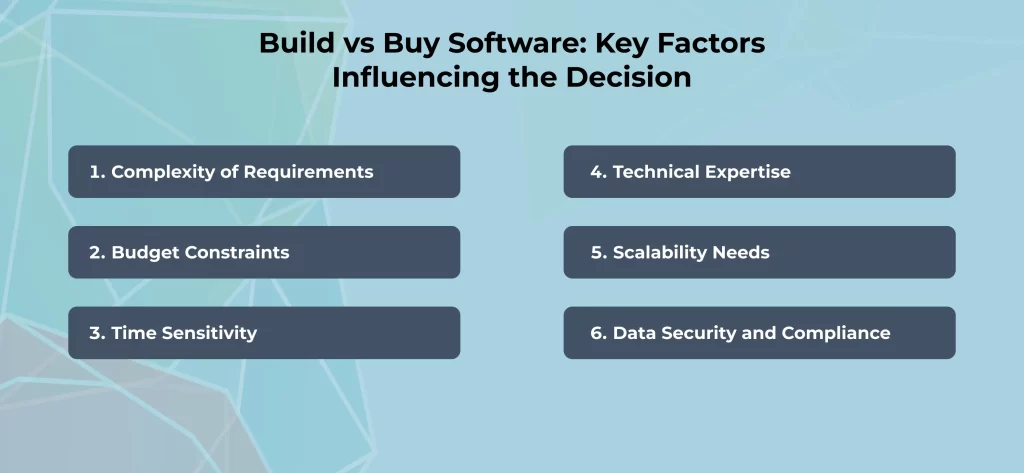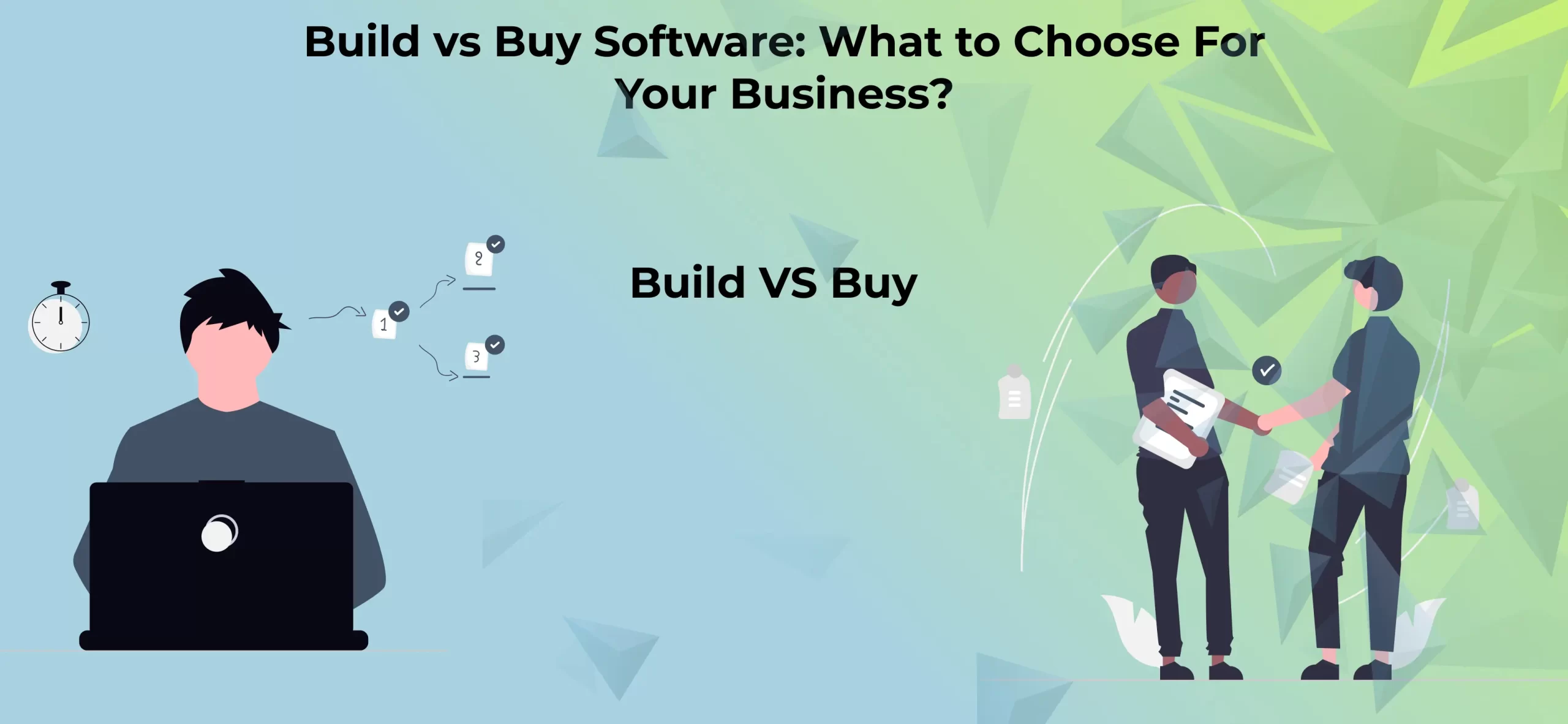Making the Right Software Decision:
Build vs Buy As a tech executive navigating complex business requirements, making the right build vs buy decision can directly impact your company’s long-term success. Choosing to build your own software offers unparalleled custom solutions, ensuring the platform is tailored to your processes, security needs, and compliance standards. This route gives you complete control over features, integrations, and customer support expectations, which is ideal for businesses with unique software development goals or niche markets. However, building custom software in-house demands extensive planning, time, skilled developers, and carries the cons of build such as higher costs and ongoing maintenance.
On the other hand, opting to buy software—especially buying off the shelf software—is a faster way to meet common software requirements. Purchased software from reliable vendors comes pre-built, rigorously tested, and offers dependable security and compliance out of the box. These solutions are ideal for businesses looking to scale quickly without stretching internal resources. Yet, the trade-off can include limited customization, integration challenges, and less control over updates or support.
Whether you decide to invest in a built software solution or opt for a purchased software package, it’s crucial to align your decision with your long-term strategy, budget, and operational needs. Evaluate the pros and cons carefully—building in-house might be the perfect fit for growth-focused businesses, while buying off-the-shelf software suits those prioritizing agility and cost-efficiency. Either way, the right software solution can drive innovation, improve productivity, and give you a competitive edge.
Build vs Buy Software: Strategic Considerations for Modern Businesses
In today’s competitive digital landscape, choosing between build vs buy software isn’t just a technical decision—it’s a strategic one. Whether you’re launching a startup or scaling a small business, your software development choices can dramatically affect operations, costs, and growth. Understanding the build vs buy software decision framework is key to making the right move.
When comparing custom software vs off-the-shelf software, think beyond short-term functionality. Building custom software enables complete alignment with business requirements, offering a custom solution tailored to your exact needs. This can include superior security and compliance, optimized workflows, and long-term scalability. Companies that build in-house gain full control over product development and enjoy the ability to evolve the system as the business grows.
However, the cons of build are real. A build decision involves higher initial investment, longer development time, and ongoing maintenance responsibilities. That’s where the cost comparison build vs buy software becomes crucial—it’s not just about upfront costs but also long-term ROI.
On the flip side, buying off the shelf software or a purchased software package provides a quicker launch, established customer support, and a stable product maintained by experts. It’s often the best route when to buy software instead of building, especially if your needs are common across industries or you’re operating with limited resources. For many, this model helps meet software requirements quickly without sacrificing core functionality.
But here’s the twist—businesses no longer have to choose only one path. A hybrid model, where companies start by buying software and later build your own software for key differentiators, is increasingly popular. This strategy balances speed and customization and is particularly effective for startups and small businesses.
Consider these real-world build vs buy software case studies: some startups begin with off-the-shelf solutions to minimize cost, but as they grow, shift to custom platforms to improve performance and flexibility. Others invest from day one in building proprietary systems to support unique offerings and gain a competitive edge.
Ultimately, there’s no universal answer—but there is a right answer for your business. Evaluate your software solution needs, internal capabilities, risk tolerance, and long term goals. The build vs buy software pros and cons must be assessed not just technically, but strategically.
Whether you’re aiming to build or buy, the future of your operations depends on software that aligns with your vision. Let that be your guide in the evolving world of software development.
Steps To Develop A Logistics App

Selecting between off-the-shelf software vs custom development for your business software strategy is of critical importance, and many factors should weigh heavily when making that choice.
Complexity of Requirements
Your business requirements’ intricacy and uniqueness is of great significance. If your required functionalities can easily be addressed by standard off-the-shelf software solutions, buying might be best; but when your processes require highly customized features not currently offered through existing solutions (i.e. niche features or intricate integrations that don’t exist yet) this may indicate custom development is more suitable – tailored solutions may offer greater compatibility than off-the-shelf ones!
Budget Constraints
Financial constraints are of primary concern to most businesses. Off-the-shelf software typically features lower upfront costs; however subscription fees and the potential need for customizations or add-ons can increase its total cost over time. Custom software development usually requires more upfront investment but may yield better long-term value by meeting exactly your requirements without unnecessary features or workarounds that increase its total costs over time. A thorough cost/benefit analysis that accounts for both immediate and long term expenses should always be carried out when making such decisions.
Time Sensitivity
Timing of Software Solution Deployment is also a key consideration, with off-the-shelf solutions generally offering faster implementation timelines due to already developed products being ready for deployment. If your needs or deadlines require immediate solutions, buying readymade may be your only viable choice; otherwise custom software development might offer greater opportunities.
Technical Expertise
Your in-house technical capabilities play a pivotal role when considering whether to build or buy software solutions. Installing and configuring off-the-shelf solutions often require certain levels of proficiency for implementation and configuration; custom software development usually necessitates employing skilled development teams either internally or outsourced for its entirety lifecycle; without these capabilities available at your organization, purchasing supported solutions might be more suitable as a long term option.
Scalability Needs
Be conscious of your future growth trajectory before formulating a software strategy for your business. Off-the-shelf solutions may offer limited scalability options to accommodate for unique growth patterns; custom software on the other hand can be designed specifically with long-term scalability in mind to grow alongside your company without necessitating disruptive platform upgrades in future years. It is crucial that businesses consider future needs when crafting software strategies for themselves.
Data Security and Compliance
Your industry and data sensitivity requirements will often dictate which option is more secure, with off-the-shelf software vendors investing heavily in security while custom-built solutions allow granular control over security measures while adhering to specific compliance standards from day one. When building software from scratch becomes necessary due to stringent data protection obligations or regulatory demands, complete control and auditability might dictate this choice over another alternative.
Final Thoughts: Build vs Buy Software – What’s Right for You?
At its core, making the build vs buy software decision is about aligning your software solution with your company’s current position and future vision. Whether you’re navigating the complexities of custom software vs off-the-shelf software or evaluating the advantages of building software in-house, the right path depends on your business size, business requirements, technical capabilities, and available resources.
For startups, the build vs buy software for startups debate often leans toward off-the-shelf tools for fast implementation, but scalability may soon demand a custom solution. Meanwhile, the build vs buy software for small businesses conversation must factor in lean budgets, simple processes, and the need for dependable customer support. Understanding when to buy software instead of building can save time and costs, especially when needs are standard across industries.
To make the right build decision, businesses must consider the cost comparison build vs buy software, looking beyond initial investment to long-term value. This includes weighing build vs buy software pros and cons such as implementation time, security and compliance, vendor dependency, and ongoing support needs.
By using a strategic build vs buy software decision framework, your team can pinpoint whether to build your own software, invest in building custom software, or purchase buying off-the-shelf software to meet core software requirements.
At EchoInnovate IT, we specialize in guiding companies through this critical choice. With our deep expertise in software development and experience from dozens of real-world build vs buy software case studies, we help you define what’s best—be it building in-house, purchasing purchased software, or leveraging a hybrid approach.
Ready to transform your business with the right tech strategy? Contact EchoInnovate IT today for a tailored consultation and expert advice to help you build or buy the right software that fuels your long-term growth.
Build vs Buy Software – What to Choose for Your Business?
What is the difference between building and buying software?
Building software means creating a custom solution from scratch tailored to your business needs, while buying software refers to purchasing an off-the-shelf product that’s ready-made. Building offers flexibility and scalability, whereas buying is quicker and more affordable upfront.
When should a business build custom software instead of buying?
You should build custom software when your business has unique workflows, requires deep integration with existing systems, or aims to scale in ways that off-the-shelf solutions can’t support. Custom development is ideal for long-term growth and competitive advantage.
Is it cheaper to build or buy software?
Buying software is usually cheaper initially, but it can lead to higher costs over time due to licensing fees, limited customization, and integration issues. Building software has a higher upfront cost but can save money long-term with better efficiency and lower dependency.



